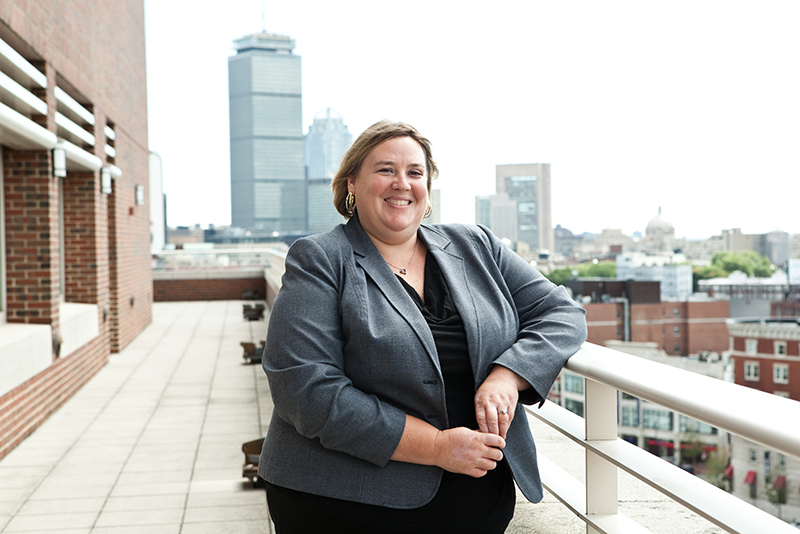Making Research Compliance Easier, If Not Easy
Kate Mellouk wants to be the researchers’ concierge

Kate Mellouk tracks how long it takes to get approval from internal committees (human safety, animal care and safety, export control, financial disclosure, biosafety, to name a few). Photo by Tim Gray
Kate Mellouk has what may be one of the toughest administrative jobs at Boston University. She is associate vice president for research compliance for the Charles River and Medical Campuses, as well as Boston Medical Center. It is up to her office to ensure that all faculty conducting research involving human subjects, animals, biohazardous materials, or other regulated materials comply with the blizzard of federal, state, and local regulations that, numerous federal studies show, are taking increasing amounts of valuable time away from the lab.
Mellouk, who was appointed during summer 2014 after serving a year as interim associate vice president, says she wants her office to serve as the researchers’ concierge. “I want to make this as streamlined, easy, and efficient as possible,” she says. “Our goal is to reduce the burden on researchers.”
Mellouk is keenly aware of the size of that burden. She cites a disheartening statistic: Because of drastic cutbacks in funding, only 15 percent of National Institutes of Health grant applications, and 23 percent of those submitted to the National Science Foundation, are approved. And yet federal law requires that investigators submit to the Research Compliance office for approval numerous complicated forms involving conflict of interest and financial disclosure at the same time that they apply for the grant. Brilliant proposals by top scientists get turned down routinely—but since there is no way of knowing in advance, investigators still have to fill out the forms. Principal investigators of federally sponsored research projects at universities across the country spend, on average, 42 percent of their time on related administrative tasks, according to a March 2014 federal study.
“We’re not trying to torture people,” Mellouk says. “We’re not making up the forms. Because so few proposals get funded, it’s hard for us to ask researchers to fill out all the forms to go through review. We want them to hit the ground running. Understandably, they’d rather wait until they get the funding to go through compliance.”
She says her office is closely monitoring the burden of compliance on faculty, with the goal of ultimately reducing it, by tracking how long it takes to get approval from each of the various internal committees involved (human safety, animal care and safety, export control, financial disclosure, biosafety, to name a few).
“For areas that take longer than we would like, we work on streamlining processes and/or troubleshooting the problem areas,” Mellouk says. “We are evaluating all of our current systems that are in use. Ideally, we want a ‘one-stop shop’ for researchers, a portal where they can access all of their compliance information—protocols, training requirements, etc.—and make it easier for them to input necessary information.”
In an effort to eliminate the need for faculty to disclose the same information in two different places, her office is implementing an electronic conflict of interest financial disclosure system that would automatically sync with Sponsored Programs. “From the researcher’s point of view, they should only have to say it once,” Mellouk says. “They’ll say, ‘It’s in my proposal.’ I understand it and I get it. There are a lot of road bumps and red tape and it can be infuriating. We want to smooth out the bumps using the customer service model.”
Her office is also setting up what she hopes will be a more efficient system for animal use protocols and census tracking.
“Our office continually monitors our policies and procedures against what the regulations require and what is considered best practice at our peer institutions,” she says. “We want to find that perfect balance where we are facilitating research while also maintaining compliance.”
She says her office makes an effort to give equal attention to all grant proposals, no matter the size. “We try not to pay attention to dollar signs,” she says. “The little one is as important as the big one in our eyes.”
Mellouk has been with the Research Compliance office since 2006, serving as the director of the Institutional Animal Care & Use Committee (IACUC) and then executive director of research integrity and assurance. She holds a BA in biology from Boston University and a master of public administration from the University of Michigan’s Gerald Ford School of Public Policy.
Her sense of mission reflects that of University Vice President and Associate Provost for Research Gloria S. Waters. “Faculty must spend an increasingly large proportion of their time on fulfilling requirements due to regulations, as opposed to actually carrying out the work,” says Waters, adding that she wants her office “to facilitate the work of the faculty while at the same time ensuring that all of our work complies with existing regulations.”
“This is a challenge, particularly because we do not have many of the IT systems that would be necessary in order to make our work in complying with the regulations more efficient,” Waters says. “Kate is a champion of this approach. She has just the right balance to ensure that we foster a culture of safety and responsibility that adheres to regulations while at the same time realizing that the job of those in research compliance is to ease the burden on the faculty to the extent possible.”

Comments & Discussion
Boston University moderates comments to facilitate an informed, substantive, civil conversation. Abusive, profane, self-promotional, misleading, incoherent or off-topic comments will be rejected. Moderators are staffed during regular business hours (EST) and can only accept comments written in English. Statistics or facts must include a citation or a link to the citation.